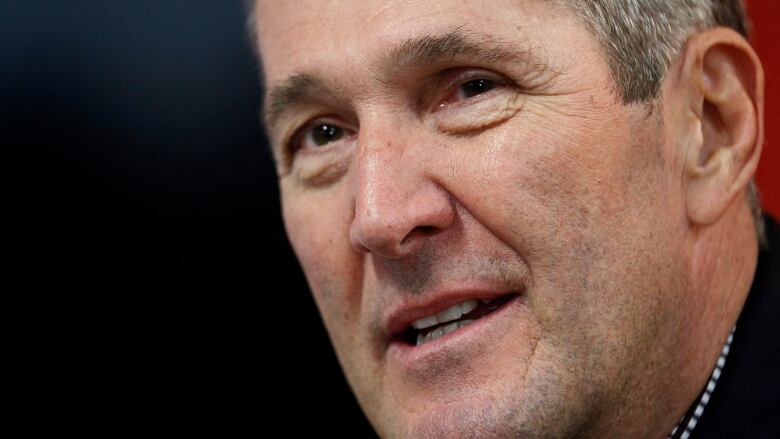Premier Brian Pallister continues year-long slide in popularity, poll suggests
Rating dip sees Brian Pallister slip to 4th-most popular premier, down from 2nd place in summer

Premier Brian Pallister is a hair less popular than he was early this fall, but his approval ratinghastaken a significant hit compared to this time last year, a new poll suggests.
The Manitoba premier's popularitydipped two percentage points, from 36 per cent to 34 per cent, between September and December, suggests apoll released Tuesdayby the research firm Angus Reid Institute.
University of Manitoba political scientist Christopher Adams said whether or not that tiny drop is just"statistical noise" doesn't change the fact that the Progressive Conservatives as a whole have had a "tough year."
The latest roundof numbers also representa 16 percentage-point drop compared to quarterly polling data published in December 2016, which pegged the premier's approval ratingat 50 per cent.
That may or may not be related to a series of "personal challenges" Pallister faced this year, Adams said. Thatincludes revelations about how much timehespent at his Costa Rica property while Opposition leader, a broken arm he suffered while hiking on vacation in New Mexico, musings over health-care premiums, and criticism he faced for starting his recent state of the province speech bythanking Winnipeg Chamber of Commerce chair and architectJohanna Hurmefor wearing high heels, Adams said.
The state of the province speechwas made in the days before the recent Angus Reid poll was conducted.
"He's created some problems for himself but also Ithink some of the tough decisions being made by the government are being reflected in the polls right now," he said.
Pallisteris nowthe fourth-most popular premier in Canada, the poll suggests; he was in third place in September and second in June.
Outgoing Saskatchewan Premier Brad Wall (53 per cent approval rating) remains at the top of the heap, a position he has held since 2010. And though she's riseneight percentage pointssince March, Ontario Premier Kathleen Wynneranked least popular (20 per cent) in the new poll.
Fifty-three per cent of the 751 Manitobanswho participated in the survey said they don't approve of how Pallister is doing; 13 per cent were unsure.For comparison purposes only, aprobabilistic sample of this size would yield a margin of error of +/- 3.6 per cent, 19 times out of 20.
'Not-very-fervent' feelings
As is often the case in the months after an election, the newly minted governing party enjoys a period of increased support in the polls. Pallisterhad a 53 per cent approval rating in September of last year, fresh off the PC'scommanding April 2016 election win.
It was clear Manitoba voters wanted a change after 17 years of NDPgovernment, saidShachiKurl.
"But sometimes that change is driven by the person leading the party, sometimes that change is driven by the other guy you're trying to get rid of, in which case it was GregSelinger," said Kurl, executive director of the Angus Reid Institute.
"There is a certain routine, there is a certain cadence, there is a certain role that people come to expect from their politicians.
"This premier has been a little bit unique and I think thatManitobansare just trying to figure him out."
Theslumping approval ratingsthat followed the election are likely less a reflection on the Progressive Conservatives' performance in general and more about Pallister in particular, Kurl cautioned.
"This sort of milquetoast, not-very-fervent approval of Brian Pallister may have more to do with that Manitobans haven't reallyfelt a connection with the leader personally. It doesn't necessarily mean they're unhappy with this government."
Premier's popularity parallels with party
A Probe Research poll released in October suggested as a party, the PCs had a 36 per cent approval rating in Manitoba, in contrast to the 53 per cent share of the vote they won on election day, said Adams.
"So the premier's ratings right now reflect what the polls are saying about the party's [ratings], and it's been a full descent from the last election."
Since being elected, the Pallistergovernment has pushed through sweeping changes to the health-care system, attempted to reign in spending through a series of cutsand freezes,introduced a retail cannabis plan that prohibited Manitobans fromgrowing pot plants at home, andbumped heads with the federal government on health care, climate change and weed policy on more than one occasion.
"We've been hearing from lots of people on our health-care tour who've noticed that Pallister forgot to mention he would be closing ERs and stopping construction on personal care homes during the election," NDPLeader Wab Kinew said in a statement."Clearly it's costing him a lot of support."
The conversion of half of Winnipeg's emergency rooms to urgent care clinics, and the proposed closure of more than a dozen rural emergency medical stations,is largely to blame for the slide, Adams said.
"They've been making some of the tough decisions and some of those decisions have not been popular."
'We remain steadfast'
A spokesperson from the premier's office said the Progressive Conservatives ran a campaign on repairing services and fixing finances "after 17 years of reckless overspending, ever-increasing debt and higher taxes" under the NDP.
"This requires making difficult decisions," the statement read. "We remain steadfast in our commitment to do the job we were elected to do and will see how the poll on election day in 2020 turns out."
Nationwide, 5,413 Canadians took part in the online survey, which was conductedDec. 7-14. Results from a sample this sizeare considered accurate within +/- twopercentage points, 19 times out of 20.
With files from Bryce Hoye












_(720p).jpg)


 OFFICIAL HD MUSIC VIDEO.jpg)
.jpg)



























































































